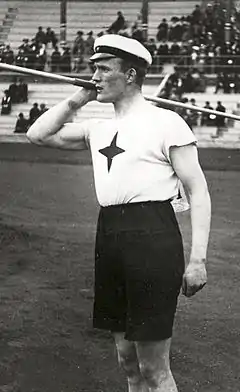Hugo Wieslander
Karl Hugo Wieslander (11 June 1889 – 24 May 1976) was a Swedish athlete. He set the inaugural world record in the pentathlon in Gothenburg in 1911 with a score of 5516 points. The following year he finished second in the decathlon at the 1912 Summer Olympics in Stockholm, 688 points behind Jim Thorpe.[1] In 1913, after it was discovered that Thorpe played professional baseball for a minor league team, Thorpe was disqualified for not being an amateur. Wieslander was declared the winner of the 1912 Olympics and awarded the gold medal, which he refused to accept.[3] In 1982 Thorpe was reinstated by the IOC with Hugo Wieslander as joint winners of the 1912 Olympic decathlon.[4]
 Hugo Wieslander in the 1910's | |||||||||||
| Personal information | |||||||||||
|---|---|---|---|---|---|---|---|---|---|---|---|
| Born | 11 June 1889 Ljuder, Lessebo, Sweden | ||||||||||
| Died | 24 May 1976 (aged 86) Bromma, Stockholm, Sweden | ||||||||||
| Height | 1.82 m (6 ft 0 in) | ||||||||||
| Weight | 81 kg (179 lb) | ||||||||||
| Sport | |||||||||||
| Sport | Athletics | ||||||||||
| Event(s) | Long jump, high jump, shot put, discus throw, javelin throw, decathlon | ||||||||||
| Club | IFK Stockholm | ||||||||||
| Achievements and titles | |||||||||||
| Personal best(s) | LJ – 6.56 m (1912) HJ – 1.80 m (1908) SP – 13.15sq (1908) DT – 37.53 m (1908) JT – 52.77 m (1908) Decathlon – 5965 (1912)[1][2] | ||||||||||
Medal record
| |||||||||||
Wieslander competed in the long jump, discus throw, shot put and two types of javelin throw at the 1908 Olympics. He completed only the freestyle javelin throw event, in which he placed fifth. At the 1912 Olympics, besides his decathlon achievement he finished seventh in the pentathlon.[1] Nationally Wieslander won four Swedish titles: in the high jump (1907), decathlon (1909) and pentathlon (1910 and 1911); in 1906–1908 he placed second-third eight times in various jumping and throwing events.[5] In 1913 he passed the state surveying exam and became employed by the Swedish cartography agency (sv:Rikets allmänna kartverk). Later for many years he was uncomfortable with keeping the 1912 gold medal and was contemplating to return it to Thorpe. He finally reconsidered, and in 1951 donated it to the sports museum at the Swedish School of Sport and Health Sciences. In 1954 it was stolen from there and never recovered.[6]
References
- Hugo Wieslander Archived 30 April 2009 at the Wayback Machine. Sports-Reference
- Hugo Wieslander. trackfield.brinkster.net
- https://www.abebooks.com/docs/Community/Featured/olympics-crisis.shtml
- Jim Reisler (2008). Cash and Carry: The Spectacular Rise and Hard Fall of C.C. Pyle, America's First Sports Agent. McFarland. pp. 60–. ISBN 978-0-7864-5262-0.
- Hugo Wieslander 1889–1976. storagrabbar.se
- Hugo Wieslander. Swedish Olympic Committee
External links
| Wikimedia Commons has media related to Hugo Wieslander. |